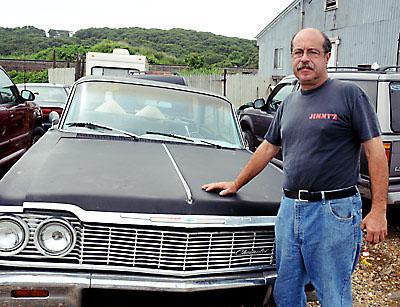Mechanic Is Vindicated in Civil Rights Case

Seven years after twice seizing cars and other belongings from a property on Navy Road in Montauk, the East Hampton Town Board has settled a civil rights lawsuit brought by the homeowner.
The board’s unanimous vote on Tuesday authorized the town attorney’s office to pay $150,000, via the town’s liability insurer, to Thomas Ferreira, a mechanic who operates Automotive Solutions. The town will also pay half the $20,000 lien imposed on the property, the cost of the confiscations, which were conducted by a private contractor.
Mr. Ferreira had argued in U.S. District Court in Central Islip that neighbors, town officials, and civic groups had conspired to force him out of business, and that the town had used illegal closed-door sessions to orchestrate a plan to oust him from the property, which overlooks Fort Pond Bay.
“I’ve been vindicated,” Mr. Ferreira said yesterday. “Now, I’ve been compensated.”
The property in question is in an area whose zoning was upgraded in 1983, from commercial-industrial to residential. Mr. Ferreira held state and town licenses to operate his business, but neighbors complained that cars and debris were an eyesore and a hazard, the latter point disputed by the mechanic. Because the rezoning could have put him out of business, he sued the town, and won. In September 2003, a town building inspector clarified the issue by ruling the business was a pre-existing nonconforming use and thereby legal.
In early 2009, before the town board authorized the forced removal of what it called litter, on the grounds that it was a hazard to public health and safety, Mr. Ferreira settled numerous citations in Town Justice Court related to the condition of his yard. In moving to seize cars and equipment from his property, the board said it was acting on complaints from neighbors and from the town’s litter committee. Dominic Shirrippa, then the director of code enforcement, and Kenneth Glogg, a code enforcement inspector, had declared that the property’s abandoned cars, tires, propane tanks, “and other combustible materials when ignited . . . would lead to possible catastrophic consequences.”
But James Dunlop, then the town’s assistant chief fire marshal, inspected the property in May 2009 and found “no violations of state and local code were noted at the time.” In 2013, he and Michael Johnson, who was Mr. Dunlop’s superior at the time of the June and September 2009 raids, questioned the authenticity of documents attributed to them that were used to justify the seizures.
In the trial, which began on May 9, “Ken Glogg testified that he believed there was some kind of court order, then acknowledged that he had no such court order, and no inventory of items to be seized, so they seized everything,” according to Lawrence Kelly, a lawyer for Mr. Ferreira. Mr. Johnson, he said, “testified that the town attorney had him insert language into a document without advising the inspector who signed the document of the inserted language.”
Mr. Kelly had previously told The Star that the fire marshals believed that Madeleine Narvilas, a former assistant town attorney, had engineered falsified documents.
Mr. Kelly said he read to the jury the Fourth Amendment to the Constitution, which prohibits unreasonable searches and seizures, “and it became clearer with every witness that the town did not have a reason to enter onto the property” to seize Mr. Ferreira’s belongings. In short, Mr. Kelly said, the town board violated Mr. Ferreira’s rights. “That’s the lesson of the case. Towns can overreach, and you need the rule of law to stop them from overreaching.”
A call to the town attorney’s office seeking comment had not been returned as of yesterday afternoon.
